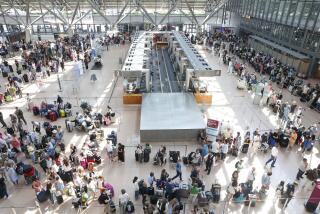Travelers, Be Y2K-Wise
- Share via
Americans have been given many assurances that most Y2K-related problems in the United States will be relatively mild, manageable and short-lived. But what can you expect if you are going to be abroad when the clocks roll forward to Jan. 1, 2000? The possibilities cover the entire range, from barely noticeable inconveniences to disruption of medical care and heating facilities.
As you surely know by now, Y2K, the year 2000 glitch, involves problems that might occur in computers and other electronic devices that use two digits to denote the years 1999 and 2000, as in 99 and 00.
Some of the minor incidents that will occur are not themselves glitches. For instance, SNCF, the French national rail operator, will stop all of its trains between 11:55 p.m. and 12:15 a.m. to reassure travelers who fear accidents when the New Year arrives. Deutsche Bahn, the German railway, will do the same.
Early on, in September, Virgin Atlantic Airways, Britannia and LOT Polish Airlines announced that their planes will stay on the ground Jan. 1. Other airlines, including two in Australia, will offer limited passenger service or none at all because of low public demand for seats. On a more serious note, among the 89 nations that account for 97% of all foreign travel destinations for Americans, more than 30 have provided no information on Y2K readiness in their aviation systems.
Separate federal Transportation Department and State Department Web sites provide more information on what American air travelers can expect--https://www.fly2k. dot.gov or https://travel.state.gov/y2kca.html. For the latter site, click on the “Go to the Country Sheets with Y2K Information” link to get expanded information on a nation’s overall Y2K readiness.
In Belarus and some other parts of the former Soviet Union, for example, Americans should be prepared for “power, water and heat outages during cold winter weather that can last several days or more.”
For its part, the State Department has been criticized for stopping short of “Don’t go there” warnings for countries where disruptions in medical care, the economy and utilities are likely. But the State Department has given any American with access to a computer and an Internet connection the means to make informed choices about travel plans. That ought to be good enough.
More to Read
Sign up for The Wild
We’ll help you find the best places to hike, bike and run, as well as the perfect silent spots for meditation and yoga.
You may occasionally receive promotional content from the Los Angeles Times.






